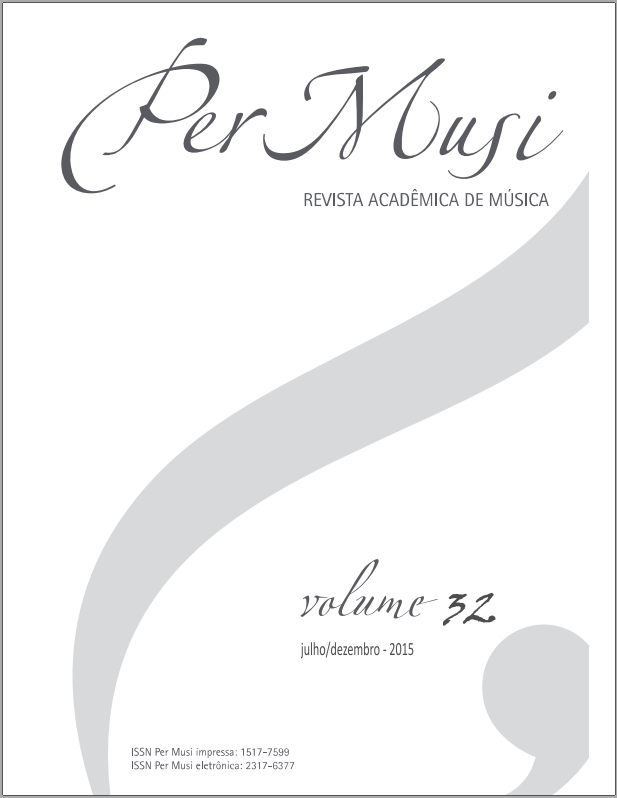“Amor” e “morte” nos madrigais de Carlo Gesualdo
um estudo sobre o desenvolvimento da escrita musical e textual
Palavras-chave:
Renascimento, Madrigal italiano, Carlo Gesualdo, Música e textoResumo
A escrita musical do compositor Carlo Gesualdo transforma-se ao longo de seus seis livros de madrigais. Na primeira fase, Gesualdo utilizava os procedimentos mais comuns na escrita musical para ressaltar estes termos, como a escrita contrapontística, contrastando com a escrita homofônica. Nas fases seguintes, ele passou a procurar elementos musicais mais sofisticados que permitissem explorar diferentes sonoridades. Por meio deste processo, o compositor destacou, de forma mais contundente, palavras e narrações dos poemas, recorrendo principalmente a resultantes harmônicas incomuns e a falsas relações melódicas. A análise do uso destes termos ao longo da obra demonstrou o aprofundamento da expressividade e o amadurecimento dos procedimentos musicais utilizados pelo compositor.
Referências
MISURACA, P. (2000). Carlo Gesualdo, Principe di Venosa. Palermo: L’Epos.
WATKINS, G. (1991). Gesualdo: The Man and His Music. Oxford: Clarendon Press.
IUDICA, G. (1993). Il Principe dei musici. Palermo: Sellerio editore.
Referências de partituras e gravações
GESUALDO, C (2010). Don Carlo Gesualdo (1566-1613), The Complete Madrigals, 6 volumes. The Kassiopeia Quintet. Netherlands: GLO 5241, Globe Records.
WEISMANN, W. WATKINS, G. (1980). Gesualdo di Venosa – Madrigale für Fünf Stimmen – Erste Buch. Leipzig: Deutscher Verlag für Musik.
WEISMANN, W. WATKINS, G. (1988). Gesualdo di Venosa – Madrigale für Fünf Stimmen – Zweites Buch. Leipzig: Deutscher Verlag für Musik.
WEISMANN, W. WATKINS, G. (1980). Gesualdo di Venosa – Madrigale für Fünf Stimmen – Drittes Buch. Leipzig: Deutscher Verlag für Musik.
WEISMANN, W. WATKINS, G. (1980). Gesualdo di Venosa – Madrigale für Fünf Stimmen – Viertes Buch. Leipzig: Deutscher Verlag für Musik.
WEISMANN, W. WATKINS, G. (1980). Gesualdo di Venosa – Madrigale für Fünf Stimmen – Fünftes Buch. Leipzig: Deutscher Verlag für Musik.
WEISMANN, W. WATKINS, G. (1982). Gesualdo di Venosa – Madrigale für Fünf Stimmen – Sechstes Buch. Leipzig: Deutscher Verlag für Musik.
Downloads
Publicado
Edição
Seção
Licença
Copyright (c) 2015 Per Musi

Este trabalho está licenciado sob uma licença Creative Commons Attribution 4.0 International License.

Exceto onde está indicado, o conteúdo neste site está sob uma Licença Creative Commons - Atribuição 4.0 Internacional.












